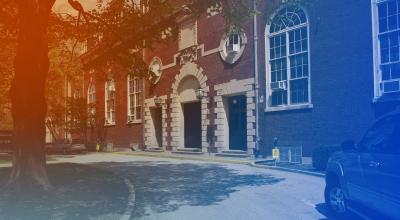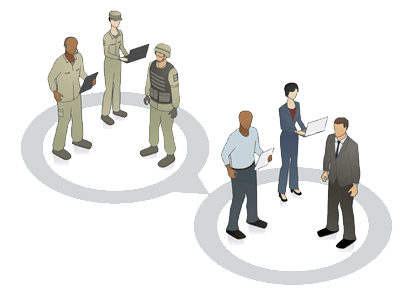
Veterans Day Event Examines Employment
AHS E-News Winter 2020

Prior to the coronavirus pandemic, military veterans were enjoying relatively low unemployment rates and were largely satisfied with their jobs. However, those lower in military rank at the time of transitioning to the civilian workforce—junior enlistees and warrant officers—were more likely to be paid on an hourly rather than salaried basis, and were more likely to be looking for new positions. Those who had service-connected disabilities felt their disabilities were a barrier to employment. Combat exposure, post-traumatic stress disorder, and homelessness also created barriers to a successful transition into the civilian workforce.
These are some of the key findings from a national survey of veterans conducted by the Military Service Knowledge Collaborative (MSKC) of the Chez Veterans Center in partnership with the School of Labor and Employment Relations’ Project for Middle Class Renewal and Jobpath, a nonprofit national service organization for military veterans.
The results of the survey were released during the Center’s third annual Veterans Day event, “Veterans in the Labor Market: Readiness, Recruitment, Retention,” which also was sponsored by the U.S. Department of Labor’s Veterans’ Employment and Training Service. The study was made possible by support from GI Go Fund.
This year’s event, held via Zoom on November 16, featured representatives of higher education, corporate, nonprofit, and governmental sectors, including Illinois Governor J.B. Pritzker, who expressed his gratitude as the son and grandson of veterans for the work the Chez Veterans Center does to support veterans in the workforce.
“Both here in Illinois and across the nation, your findings and your data are essential to furthering the belief we all share that the people who made sacrifices for this nation should have every opportunity to shape a good living for themselves and their families back home,” he said, adding that it is his mission to find creative ways across all state agencies to support military-connected citizens.
Linda Chapa LaVia, director of the Illinois Department of Veterans Affairs, said it’s impossible for non-veteran civilian employers to truly understand the military experience. “While every veteran’s experience is different, there are a series of staple issues that most face upon leaving the military: readjustment to civilian life and structure, transitioning military skills to civilian job skills, adjustment to civilian workforce culture, navigation of benefits and services, the invisible and visible wounds of war, and employer bias.”
She went on to explain that even though today’s military veterans are not returning to the protests and harassment that Vietnam veterans faced, employers still make assumptions that people with military experience are inflexible, conservative, potentially volatile, and “broken,” especially if they have been diagnosed with post-traumatic stress disorder or traumatic brain injury.
Perry Yaw, senior manager for global sales and marketing at Boeing, retired from active duty after 30 years in the Navy and joined Boeing. He stressed the importance of educating employers about the skills veterans bring to their jobs.
“The work ethic you demonstrate day in and day out and your dedication to mission is incredibly valuable to the companies and businesses you will find your way to,” he said. “Your leadership and initiative, your understanding of what it means to be a team player—you understand that better than most.”
In their report on the survey, the researchers offered a number of recommendations for employers, policy makers, organizers of job fairs, and veterans. You can find the full report here. At the conclusion of the virtual event, they issued a call to action to participants that included becoming a mentor to student veterans at the University of Illinois at Urbana-Champaign, getting involved in veteran-centered research through involvement with the MSKC, and participating in virtual events being sponsored by Chez Veterans Center next year: corporate talks with representatives of BP and Google in February and March, and a National Virtual Veteran Career Fair on April 8 that is open to veterans throughout the United States. More information on the Call to Action events can be found here.
